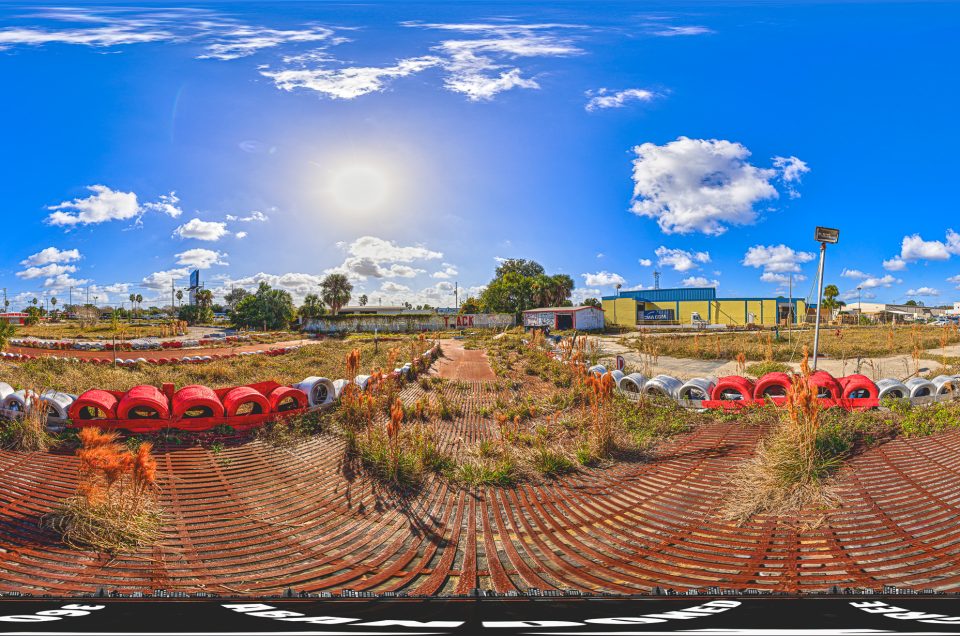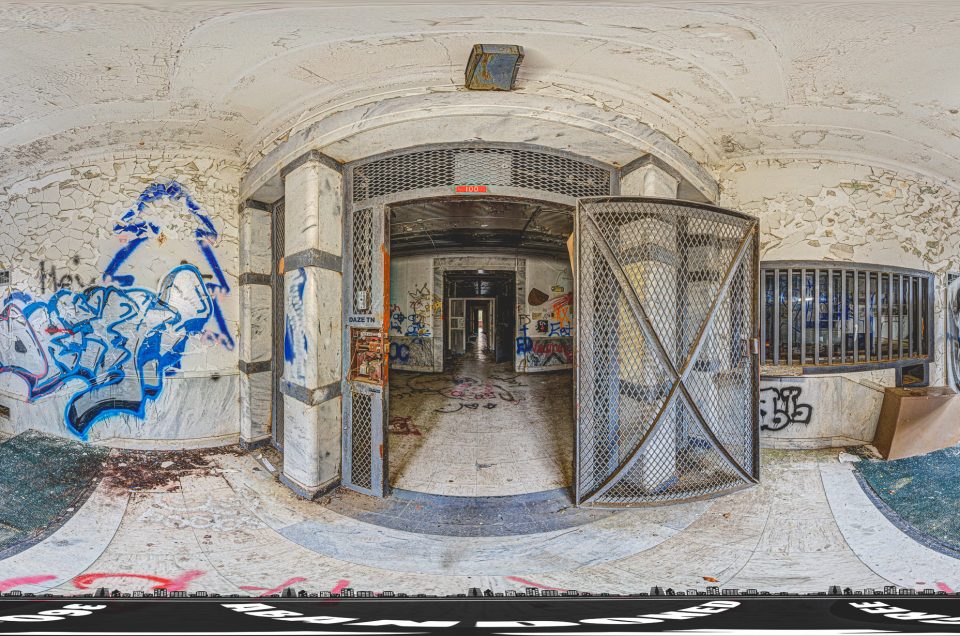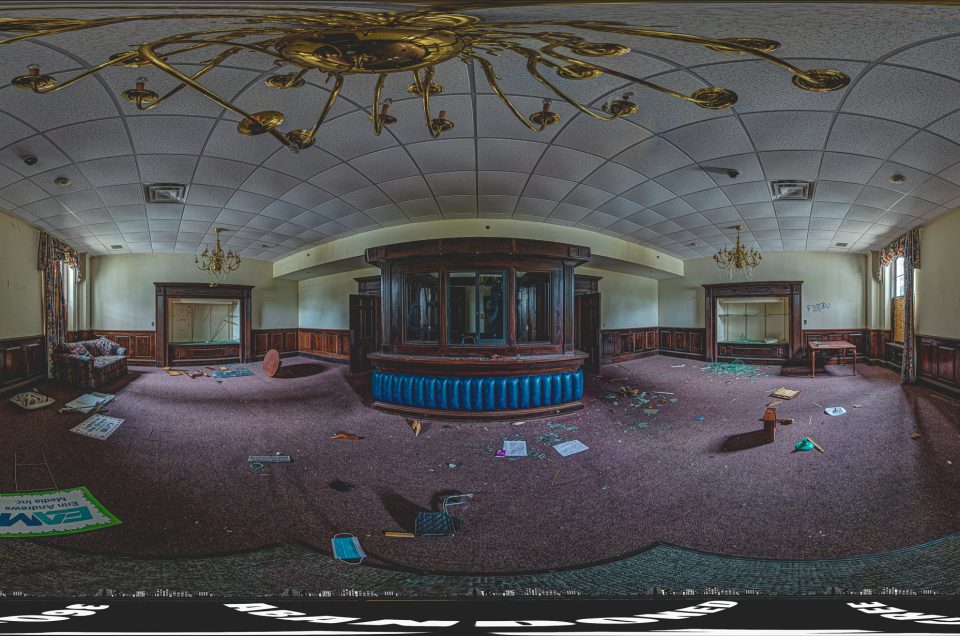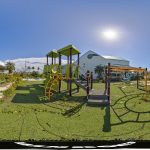Winding Oaks Farms: Ocala, Florida’s Abandoned Thoroughbred Gem for Urban Explorers
Discover the eerie beauty of Winding Oaks Farms through an immersive virtual experience designed for urban explorers. With sixteen stunning 360-degree panoramic images, this virtual tour provides a captivating glimpse into the abandoned property, allowing you to navigate its intriguing remains from every angle.
Winding Oaks Farms offers a unique journey through its silent corridors, sprawling fields, and historic structures, all captured vividly in these panoramic scenes. Step into this forgotten piece of Florida history and uncover the details hidden within the ruins, each image telling a story of the farm’s mysterious past.
Click here to view it in fullscreen.
An Adventurous Glimpse into Ocala’s Abandoned Farm
Florida is famous for its sunshine and theme parks, but it also hides fascinating relics of the past. For those into urban exploring in Florida, the abandoned Winding Oaks Farms in Ocala offers a unique adventure. Once a world-class thoroughbred horse farm, Winding Oaks now stands quiet and largely forgotten, its empty stables and overgrown pastures whispering stories of former glory. Urban explorers who venture here can step back in time and feel the historic atmosphere of a place that was once full of life. Before you grab your camera and head out, let’s dive into the history of Winding Oaks Farms – when it opened, how it thrived, why it was abandoned, and what makes it such a compelling destination among abandoned places in Florida.
From Tartan to Winding Oaks: A Storied Horse Farm History
Long before it became “Winding Oaks Farms,” this land was already steeped in horse racing history. Ocala, Florida is known as the “Horse Capital of the World,” and for over 60 years this property played a key role in that legacy. It all began in 1960 when businessman William L. McKnight of 3M (the company behind Scotch Tape) established Tartan Farms on 320 acres here. McKnight was one of the country’s wealthiest men and a passionate horseman. He even used his family’s red plaid tartan pattern as the stable’s racing silks. Under famed trainer John Nerud, Tartan Farms flourished, producing over 100 stakes-winning horses and some legendary champions. One of their most famous was Dr. Fager, who set a world record mile in 1968 that still stands today. This farm quickly became a powerhouse in Florida’s thoroughbred industry, nurturing other greats like Codex, Dr. Patches, and even Unbridled, the 1990 Kentucky Derby winner.
In 1970, a new chapter began when Harry T. Mangurian Jr. bought the property and renamed it Mockingbird Farm. Mangurian, known as the owner of the NBA’s Boston Celtics, was also a renowned thoroughbred breeder. Under his ownership, the farm continued producing top racehorses and champion bloodlines. Mangurian’s stallion Valid Appeal became one of Florida’s leading sires, and he himself earned honors like the National Breeder of the Year (1998, 2000) and an Eclipse Award of Merit in 2002. This property was firmly on the map as a cradle of champions. By the late 1990s, Mockingbird Farm spanned nearly 1,000 acres of prime Ocala pastureland, complete with training tracks and dozens of barns.
The modern identity of the farm took shape at the turn of the millennium. In 2001, Mangurian sold Mockingbird Farm to Eugene Melnyk, a Canadian businessman and sports team owner. Melnyk rechristened it Winding Oaks Farm and vowed to uphold its legacy: “I’m committed to keep it as a working farm,” he said, noting the community’s gratitude that he wasn’t selling to developers. Melnyk – who was known for owning the NHL’s Ottawa Senators – poured resources into the farm to make it a state-of-the-art thoroughbred facility. He expanded the property to about 1,000 acres and constructed a new one-mile training track (plus a 7/8-mile turf course) to rival professional racetracks.
Winding Oaks Farm officially opened in January 2002 under Melnyk’s ownership. It wasn’t open to the public; it was a private training and breeding operation, but a world-class one. Melnyk established his Melnyk Racing Stables here, which quickly became one of North America’s top thoroughbred racing stables. At its peak, Winding Oaks employed around 90 staff and housed some 380 horses on its lush grounds. The farm specialized in breeding, raising, and training elite racehorses. Many champions lived or trained at Winding Oaks during this era, adding to the site’s historic significance. For example, Archers Bay (winner of Canada’s Queen’s Plate in 1998) was stabled here, as was Speightstown, who won the 2004 Breeders’ Cup Sprint and later became an eminent stallion. Other notable names include Flower Alley (2005 Travers Stakes winner) and Sealy Hill, a filly who swept Canada’s Triple Tiara and became Horse of the Year in 2007. With such accomplishments, Winding Oaks was not just another farm – it was a legendary racing powerhouse, carrying forward the legacy of the Tartan and Mockingbird years.
Under Melnyk’s guidance, Winding Oaks enjoyed roughly a dozen years of prominence. For about 12 years (2002–2014), the farm consistently produced winners and garnered awards. Melnyk himself was honored as Canada’s Sovereign Award Owner of the Year in 2007, reflecting the success of horses bred and trained at Winding Oaks. The farm’s importance can’t be overstated – it sits on land that had already produced Hall of Fame horses, and Melnyk’s investment ensured it remained a jewel of Ocala’s equine community. It truly carried a historic thoroughbred legacy. In fact, the farm even has an equine cemetery on-site, where some of Florida’s most famous racehorses are buried (more on that later).
Glory Fades: Why Winding Oaks Farm Was Abandoned
Every rise eventually meets a fall. In the case of Winding Oaks Farms, the end came not through catastrophe, but through changing priorities. In 2014, Eugene Melnyk made the tough decision to retire from the thoroughbred business, effectively winding down operations at Winding Oaks. After more than 20 years in horse racing, Melnyk chose to exit the industry – a move that had huge implications for the farm. He announced plans to cease breeding and racing activities and intended to sell a good portion of the farm for development. This marked the beginning of Winding Oaks’ journey into abandonment. By late 2014, the once-bustling barns and training tracks grew quiet as the horses were sold off or moved to other facilities. For a time, Winding Oaks Farm continued on a smaller scale as a boarding and training center (no longer the home base of a racing stable). But without Melnyk’s racing operation, the property was largely underused and waiting for its next chapter.
Melnyk’s decision was part of a larger trend in the area. Ocala’s farmlands have been under pressure from booming development. What was once rolling pasture is now prime real estate for houses, shopping centers, and even car dealerships. In fact, Winding Oaks Farm was one of the last iconic horse farms along State Road 200, a road that used to be a scenic corridor into Ocala’s horse country. Once Melnyk retired and put the land up for sale, developers quickly showed interest. Over the next few years, pieces of the farm were carved off for new uses. A Jaguar/Land Rover car dealership was built on a section of the farm fronting the highway, replacing green paddocks with glossy cars. Locals who drive by today will see this modern dealership as a stark reminder that times have changed.
While a small part of Winding Oaks remained dedicated to horses (more on that below), the majority of the property sat vacant and abandoned after 2014, awaiting redevelopment. Weeds overtook some of the fence lines, and the once-immaculate training track saw less use. The atmosphere of the farm changed from vibrant to eerily still – a hauntingly beautiful landscape for those who appreciate abandoned places. Urban explorers began to eye Winding Oaks Farms as a potential destination, drawn by the juxtaposition of its grand past and its quiet present. However, it’s important to note that during this period the land was (and still is) private property, owned by Melnyk’s company and slated for future projects. So while it was “abandoned” in the sense of no longer operating as a farm, it wasn’t entirely forgotten – just in limbo.
In recent years, Winding Oaks Farms’ fate has become clearer. Developers officially purchased about 735 acres of the farm in a multi-million dollar deal to transform it into a massive residential community. Plans approved by the city call for over 3,000 new homes to be built on this former farm, including roughly 2,068 single-family houses and 1,080 multi-family units like condos or apartments. Essentially, an entire new neighborhood will rise where thoroughbreds once galloped. Ocala’s City Council voted unanimously to green-light this project, meaning the pastures and paddocks of Winding Oaks will soon be filled with streets and houses instead of horses. Construction is either underway or imminent (depending on when you visit), so the clock is ticking for those who want to see the site in its transitional, abandoned state. The old saying “progress waits for no one” certainly applies here – the pastures that were once Winding Oaks Farm will soon be gone.
What Remains Today: Exploring the Present Landscape
Walking onto Winding Oaks Farms today, you’ll find yourself at a crossroads of past and future. Much of the 1,000-acre expanse is still open land as of now, but signs of change are visible. The property is split into different sections with different fates:
-
Sequel at Winding Oaks (Training Center): In a fortunate twist for horse lovers, 224 acres of the farm have been saved as an active equine training center. In 2019, a local horsewoman named Becky Thomas bought this portion, including the big training track and several barns. She established “Sequel at Winding Oaks,” which continues to operate as a thoroughbred training facility. If you peer over the fences on this side, you might even see horses exercising on the track in the early mornings. Thomas has invested in new barns and upkeep, meaning this part of Winding Oaks is not abandoned at all – it’s very much alive with young horses in training. For urban explorers, that means you should avoid the active training area (it’s private and busy). However, it’s good to know that not all of Winding Oaks’ legacy is lost; one corner remains a haven for racehorses, maintaining the farm’s original spirit.
-
The Abandoned Farm Areas: The rest of Winding Oaks Farms – roughly three-quarters of it – is the section that was sold for development. This is the truly “abandoned” area of the property, where no farming takes place anymore. Here you may encounter empty horse barns, equipment sheds, and worker housing that have been left to the elements (though some structures might have been removed in preparation for development). Fields where thoroughbreds once grazed are now just vast open lots, some with overgrown grass and broken fences. A stroll through these parts (if you manage to get access) feels like walking through a ghost of a farm: feed tubs still hang on stall walls, and you can almost hear distant echoes of neighing horses and tractor engines. Nature is slowly reclaiming the land; expect to see tall weeds, wildflowers, and maybe some wildlife like birds or the occasional deer making a home in the quiet surroundings.
-
New Developments Encroaching: As mentioned, a Jaguar car dealership already stands on the eastern edge of the former farm along the highway. This modern building, with its sleek architecture and rows of luxury cars, contrasts sharply with the rustic scenery behind it. It’s a clear sign that commercial development has arrived. Additionally, a future elementary school site has been carved out of the land (20 acres were sold to the Marion County School Board). You might notice some cleared areas or signage for the upcoming school if you explore the perimeter. And soon, there will be construction equipment paving roads for the new housing subdivision. Depending on timing, you might even see the first model homes or infrastructure being built on site. For now, though, much of it remains in a state of waiting – empty fields with survey markers, occasional earth-moving machines, and skeletons of old farm buildings standing as silent witnesses.
-
Historic Horse Cemetery: One very special spot within Winding Oaks Farms has been intentionally preserved. Atop one of the highest hills on the property, shaded by ancient live oak trees, is Florida’s largest equine cemetery. Previous owners of the farm began burying their champion horses here decades ago, and the tradition continued through the Winding Oaks era. In fact, 23 Thoroughbred horses are buried on this hill, each with a gravestone marker detailing their name, lineage, and achievements. Notable champions interred here include some of the legends from Tartan Farms days, like Dr. Fager, Intentionally, Codex, and Ta Wee – all famous names in racing lore. From the Winding Oaks period, horses like Archers Bay and Pico Teneriffe were laid to rest here as well. The good news for history buffs and explorers is that this cemetery will not be bulldozed or built over. Eugene Melnyk made it a condition of the sale that the horse cemetery be set aside as a community green space. Plans show it will remain a park-like area even after development, possibly with a historical marker explaining the significance of the site. If you ever visit (perhaps once the area is developed, it might be accessible to the public as a small park), you’ll find a peaceful clearing with rows of small headstones – a poignant reminder of the champions that once thundered across these fields.
In summary, what remains of Winding Oaks today is a mix of abandonment and continuity. Part of it is frozen in time – empty barns, a disused race track, and quiet paddocks that will soon disappear. Yet part of it still pulses with life through the ongoing training operations. This contrast makes it an especially interesting location for urban explorers who enjoy reflecting on how places change over time. You can literally see the layers of history: from old oak trees and weathered fences that have stood since the Tartan Farms era, to brand-new signs of suburbia springing up at the edges.
Safety and Tips for Urban Exploring Winding Oaks Farms
Exploring an abandoned horse farm in Florida can be an adventurous experience, but safety and legality should always be top of mind. Here are some important tips if you’re considering a visit to Winding Oaks Farms or any similar abandoned in Florida site:
-
Respect Private Property: Winding Oaks Farms is private land. Even though it’s abandoned as a farm, it’s not open for public trespassing. No legal advice here, but be aware that entering without permission could be considered trespassing. There may be “No Trespassing” signs or even security patrols, especially now that development is starting. The safest way to explore is from public vantage points (like along the fence line or adjacent roads) or by obtaining permission if possible. Sometimes local real estate or historical groups arrange tours, but don’t count on it. Always prioritize your legal safety as much as your physical safety.
-
Watch Your Step: If you do get a chance to wander the abandoned portions, be very careful. Old farm structures can be dangerous. Barn roofs may have loose panels, wooden floorboards can rot, and rusty nails or broken glass might be scattered about. Florida’s weather is harsh (hot sun, heavy rains), which means any abandoned structure deteriorates quickly. Never enter unstable buildings – a collapsed barn is not the kind of souvenir you want. Also, nature has reclaimed parts of the farm: expect tall grass, hidden holes, or uneven ground once maintained for horses but now wild. Sturdy boots and long pants are recommended to avoid snake bites or scratches from thorny brush.
-
Wildlife Encounters: This area, being quiet for years, might host some wildlife. It’s not uncommon in rural Florida to encounter creatures like snakes (possibly venomous ones like rattlesnakes or cottonmouths), spiders, wasps, or even the occasional alligator if there are ponds. Stay alert when walking through high grass or entering dim barns – you might not be alone! If you see wasp nests in the eaves or snake skins on the ground, take it as a sign to proceed with caution or turn back. Carrying a stick to gently probe ahead of you in thick undergrowth isn’t a bad idea in Florida’s wild areas.
-
Climate and Conditions: Ocala can be hot and humid, especially in summer. There’s little shade in the open fields except under the giant oaks. Carry water, wear sunscreen and a hat, and perhaps explore in the cooler parts of the day (morning or late afternoon). Afternoon thunderstorms are common, so keep an eye on the weather – you don’t want to be caught in a downpour, or worse, under lightning while out in an open field or beside tall trees.
-
Document, Don’t Disturb: As an urban explorer, your goal is to capture and appreciate the location without causing harm. Winding Oaks Farms has historical elements like the horse cemetery and possibly old equipment or signage left behind. Take only photographs and leave everything as you found it. Avoid the temptation to pocket a “souvenir” like an old horseshoe or piece of wood – not only is it likely illegal, but it removes a piece of history from the site. Moreover, do not disturb any part of the horse cemetery if you come across it. Those graves represent beloved champions; treat the area as you would any solemn historical site.
-
Be Mindful of the Active Areas: Remember, a part of Winding Oaks is not abandoned. The Sequel training center is an active business with live animals and people who work there daily. Do not trespass onto the active training facility or bother the staff. Not only would it be unwelcome, but an active horse farm can be dangerous if you’re not supposed to be there (horses spook easily, and heavy machinery might be in use). If you’re curious, admire from a distance – maybe you can catch a glimpse of horses on the track from afar, but keep clear of any restricted areas.
-
Plan for the Future: If you’re reading this a bit later on, the window for seeing Winding Oaks in its abandoned state may be closing. Once construction of homes begins in earnest, the landscape will change rapidly. It might even become an active construction zone, which is even more hazardous to enter. In the near future, the best way to “explore” might simply be by driving around the new subdivision once it’s built, and visiting the preserved horse cemetery park to get a sense of what once was. If you’re an urban explorer who loves documenting change, consider taking “before and after” photos – what the fields look like now versus what they’ll look like with houses. It’s a unique opportunity to document Ocala’s evolving story.
Conclusion: Preserving the Legacy of Winding Oaks
Winding Oaks Farms stands as a poignant example of Florida’s changing landscape. For decades, this farm embodied the height of thoroughbred racing history, from the golden days of Tartan and Mockingbird Farms to the peak of Melnyk’s Winding Oaks operation. Its abandonment is not the result of a spooky mystery or a sudden disaster, but rather a gradual transition driven by time and progress. In place of horses, soon there will be homes and families, forging a new chapter on this land. Yet, the legacy of Winding Oaks won’t be completely erased – its stories live on in history books, its famous racehorses are immortalized in the record sheets (and in the on-site graveyard), and a piece of it continues on as a training center.
For the urban explorer with an appreciation for history, Winding Oaks Farms is a treasure. It’s a chance to walk where Derby winners and Hall-of-Fame horses once trod, and to reflect on how even mighty institutions can fall silent. The farm’s empty barns and silent track remind us that every place has a life cycle. Exploring here feels almost like reading a novel – you can envision the lively past, observe the quiet present, and anticipate the future to come. It’s a bittersweet experience, but an enriching one.
In the end, whether you’re drawn by the thrill of urban exploring in Florida, the call of history, or the simple beauty of an abandoned rural landscape, Winding Oaks Farms does not disappoint. It’s at once peaceful and haunting, adventurous and educational. Just be sure to go prepared, stay safe, and respect the site so that its story can be appreciated by others even as the world around it continues to change. Happy exploring!
If you liked this post, you might be interested in learning about The Tower of Vallferosa in Spain, the Hastings Motel in Florida, or the Colonel Kvitko’s dacha in Russia.
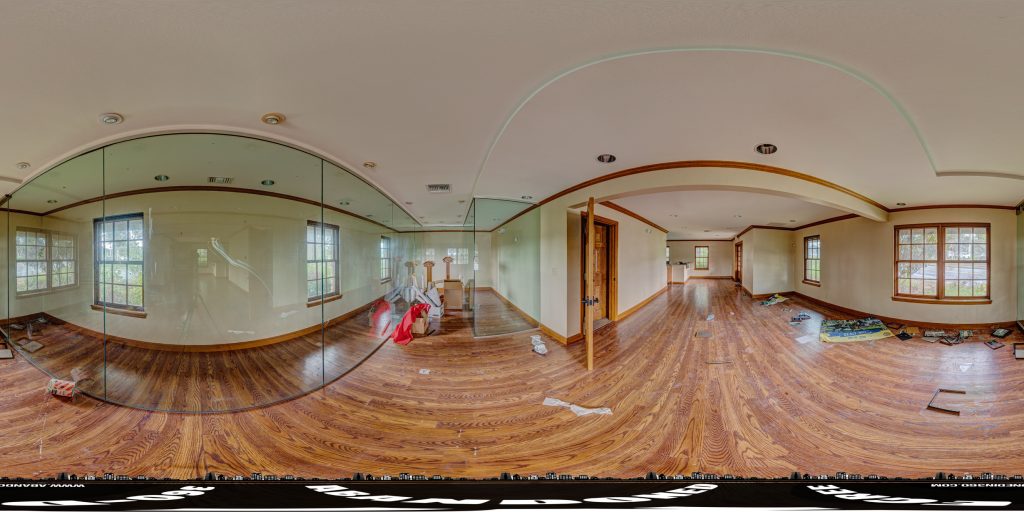
A 360-degree panoramic image inside the abandoned Winding Oaks Farms office building in Ocala, Florida.
Welcome to a world of exploration and intrigue at Abandoned in 360, where adventure awaits with our exclusive membership options. Dive into the mysteries of forgotten places with our Gold Membership, offering access to GPS coordinates to thousands of abandoned locations worldwide. For those seeking a deeper immersion, our Platinum Membership goes beyond the map, providing members with exclusive photos and captivating 3D virtual walkthroughs of these remarkable sites. Discover hidden histories and untold stories as we continually expand our map with new locations each month. Embark on your journey today and uncover the secrets of the past like never before. Join us and start exploring with Abandoned in 360.
Equipment used to capture the 360-degree panoramic images:
- Canon DSLR camera
- Canon 8-15mm fisheye
- Manfrotto tripod
- Custom rotating tripod head
Do you have 360-degree panoramic images captured in an abandoned location? Send your images to Abandonedin360@gmail.com. If you choose to go out and do some urban exploring in your town, here are some safety tips before you head out on your Urbex adventure. If you want to start shooting 360-degree panoramic images, you might want to look onto one-click 360-degree action cameras.
Click on a state below and explore the top abandoned places for urban exploring in that state.
